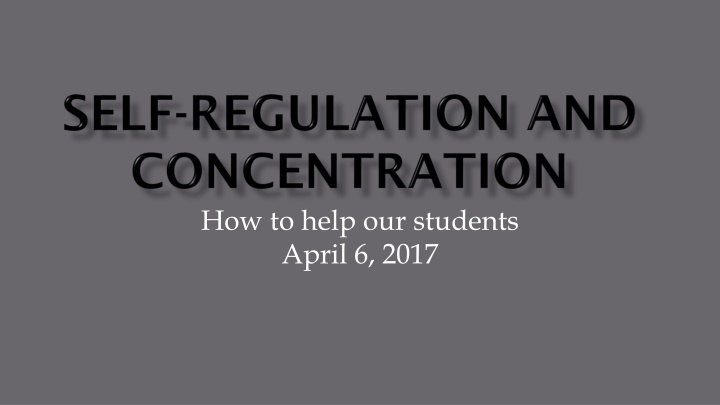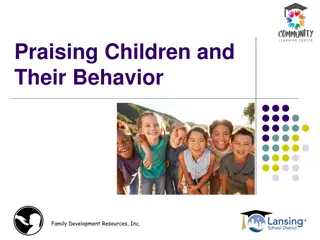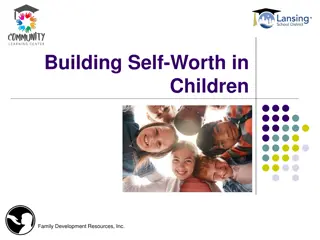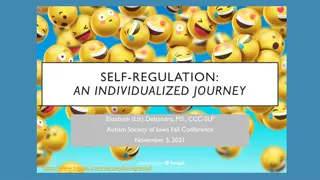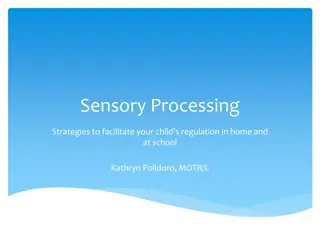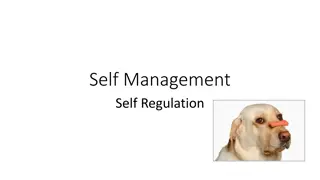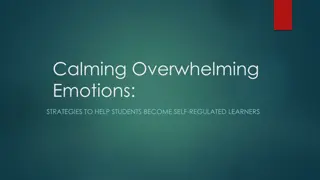Enhancing Self-Regulation Skills in Children: Strategies and Tips
Understanding and fostering self-regulation in children is crucial for their development. Self-regulation involves controlling impulses, focusing, and shifting between tasks. This article delves into the internal mechanisms of self-regulation, such as executive function, and provides practical tips to help children build these skills. It emphasizes the importance of routines, limited screen time, imaginative play, and quality sleep in nurturing self-regulation abilities. By implementing these strategies, caregivers and educators can support children in developing crucial self-regulation skills for success.
Download Presentation

Please find below an Image/Link to download the presentation.
The content on the website is provided AS IS for your information and personal use only. It may not be sold, licensed, or shared on other websites without obtaining consent from the author.If you encounter any issues during the download, it is possible that the publisher has removed the file from their server.
You are allowed to download the files provided on this website for personal or commercial use, subject to the condition that they are used lawfully. All files are the property of their respective owners.
The content on the website is provided AS IS for your information and personal use only. It may not be sold, licensed, or shared on other websites without obtaining consent from the author.
E N D
Presentation Transcript
How to help our students April 6, 2017
Self-regulation : a deep, internal mechanism that enables children as well as adults to engage in mindful, intentional, and thoughtful behaviors
1. The ability to control one s impulses and to stop doing something. 2. The capacity to do something (even if one doesn t want to do it) because it is needed.
How do you self regulate? Mouth Move Touch Look Listen
Developing brains utilize their brains executive function to build self regulation. When this part of the brain is exercised, self regulation develops. When self regulation develops, so does a child s ability to focus, stay on task, or shift quickly between activities.
Some people are born with a stronger sense of self regulation. Some people s temperaments are more inclined toward appearing self regulated. Some people will always struggle and need to find ways to cope in their world.
Introduce routines Ensure plenty of sleep time The amount of time an adult maintains focus on an infant directly correlates to the child s ability to focus Introducing books early and often, and follow up by talking about the pictures, asking questions Model paying attention Minimize exposure to screens (max 1 hour per day) Avoid toys that play for them Capitalize on playing pretend
Increase and enforce routines Minimize screen time (max 1 hour per day) Play pretend with increasingly abstract objects Provide props for imaginary play that do not relate to television or movies Minimize toys that play for the child Sing songs that require singing and body or hand motions Continue to read and draw attention to details and wonderings Play games that require stop and start or critical thinking Reasonable expectations are age + 1 year for attention span Add creative twists to undesired tasks Break large tasks down into manageable pieces Ensure adequate sleep time 8 10 hours per night
Ensure your child is getting 8 to 10 hours of sleep every night Monitor and limit screen time Consider developing a media plan so expectations are clear and consistent https://www.healthychildren.org/English/media/Pages/def ault.aspx#home Continue to model your focused attention on your child Invest in open ended toys (i.e. Legos, art supplies, blocks etc.) Take breaks from focused activity like homework and practice for other subjects like instruments and art Continue proper expectations age +1 = appropriate expectation for attention span Develop a media plan (see middle and high school for link) Teaching them to stay organized and put their own things away Make sure household help does not always organize their materials and pack their things as they need the thought processes Provide fidgets, special seating, or hard candy when homework is very difficult
Make sure your student is getting enough sleep Develop a media plan to make expectations consistent and clear https://www.healthychildren.org/English/media/Pages /default.aspx#home Share your strategies and help them develop strategies to focus their own attention Good nutrition (including lots of protein) Teaching them to stay organized Make sure household help does not always organize their materials and pack their things they need the thought processes Help them stop multi-tasking and do one task at a time Set expectations that they need to adhere to How to chunk a big project
Sensory - motor preference checklist Sensorimotor methods to change engine levels Changing how alert you feel A-46
Concentration LiteBrite Simon Chess Martial Arts Operation Raps, songs Yoga Meditation Mazes Rush Hour Sudoku
-reinforce appropriate behaviours and ignore mild inappropriate behaviours use when then contingencies such as when you finish picking up your Lego, then you can start your video. This strategy will help children see the connection between their behaviours and consequences
When do you feel your child needs the most self- regulation help? What is the routine? When are the highs and lows?
Blurting - My Mouth is a Volcano by Julia Cook Body Awareness Personal Space Camp by Julia Cook Anger Management When Sophie Was Angry, Really, Really Angry by Molly Bang Anger Management Sometimes I m a Bombaloo by Rachel Vail Anger Management Hands are Not for Hitting by Martine Agassi and Marieka Heinlen Talk to Malin Halliday in the library if you have a particular issue and she may be able to guide you to an appropriate social story.
Using visuals can help your student guide their own routine and behaviors and take away your necessity for constant reminders. Timers also help add fun and expectations Involve your student in deciding which mediators to use Using weighted materials can actually help children focus especially when they are angry or anxious Keeping materials available at a child s level helps them apply what they need when they need it
Build a routine for your student Make a mediator to help with a certain skill Walk through the process of making a media plan
http://developingchild. harvard.edu http://pediatrics.aappu blications.org/content/ 138/5/e20162591 https://www.healthych ildren.org/English/me dia/Pages/default.aspx #home Presentation by Jodie Hopkins and Sylvie Pinsonnault
